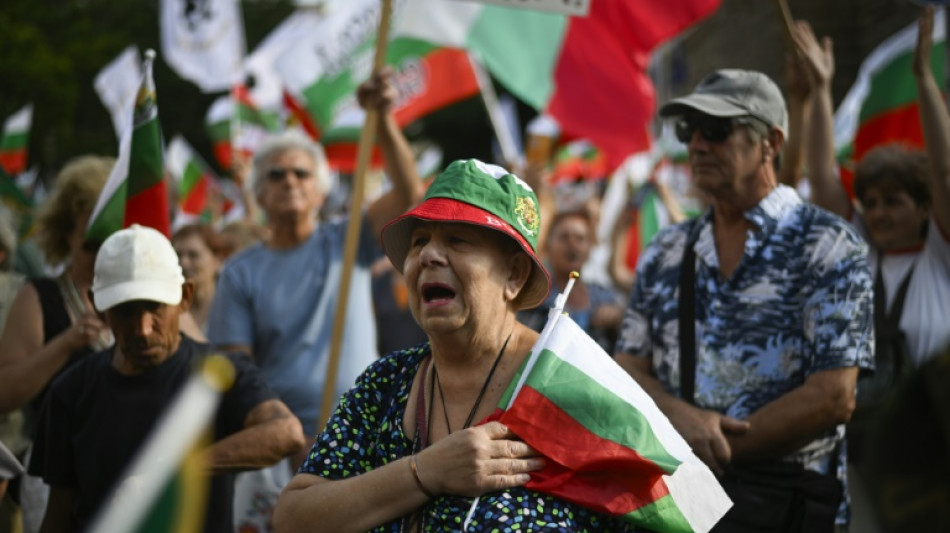
-
 Wimbledon line technology fails again as Fritz reaches semis
Wimbledon line technology fails again as Fritz reaches semis
-
Rubio imposter used AI to message high-level officials: report
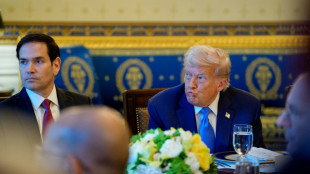
-
 Kyiv, Moscow residents baffled by Trump's wavers on Ukraine aid
Kyiv, Moscow residents baffled by Trump's wavers on Ukraine aid
-
Archer can help England rattle impressive India, says Broad

-
 Iconic Bayeux Tapestry to be loaned to Britain: French president
Iconic Bayeux Tapestry to be loaned to Britain: French president
-
Lyles to make 200m return against Tebogo in Monaco

-
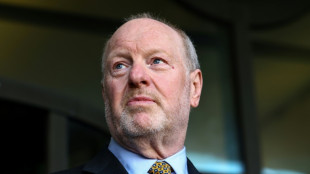 UK post office scandal may have caused 13 suicides: inquiry
UK post office scandal may have caused 13 suicides: inquiry
-
Some Europeans still travel to Iran, ignoring dire warnings
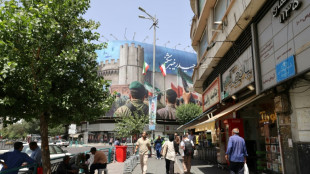
-
 ICC seeks arrest of Taliban leaders over persecution of women
ICC seeks arrest of Taliban leaders over persecution of women
-
Stocks mark time as Trump postpones tariffs deadline
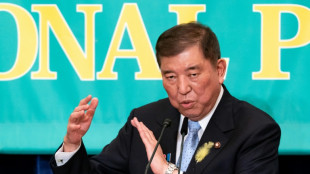
-
 India expect England's Archer to pose 'challenge'
India expect England's Archer to pose 'challenge'
-
Springboks make 11 changes for Italy Test

-
 Liverpool return to training in wake of Jota death
Liverpool return to training in wake of Jota death
-
France's Marseille airport says closing due to nearby wildfire
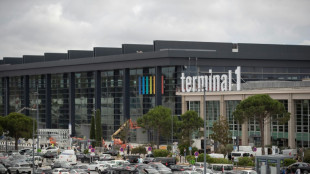
-
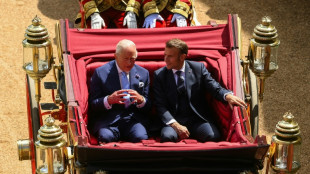 France's Macron kicks off 'historic' UK state visit
France's Macron kicks off 'historic' UK state visit
-
Aussie prop Tupou hopes Racing move will bring smile back

-
 Speeding likely cause of Diogo Jota car crash: police
Speeding likely cause of Diogo Jota car crash: police
-
Bulgaria becomes 21st member to adopt euro after EU green light
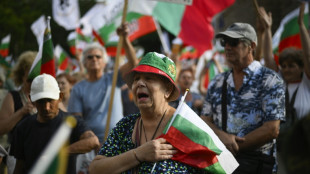
-
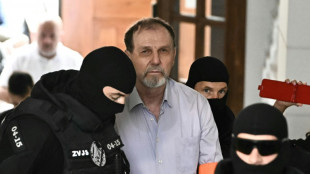 'Free culture': Slovak gunman defends Fico shooting as trial begins
'Free culture': Slovak gunman defends Fico shooting as trial begins
-
Rome to host Ukraine recovery conference as US support falters
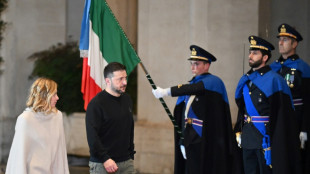
-
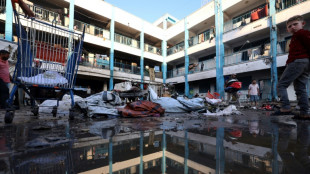 Qatar says 'we will need time' for Gaza ceasefire
Qatar says 'we will need time' for Gaza ceasefire
-
Alcaraz faces Norrie test at Wimbledon, Sabalenka eyes semi-finals

-
 Forest fire blazes in southern France
Forest fire blazes in southern France
-
Indian villagers beat five to death for 'witchcraft'

-
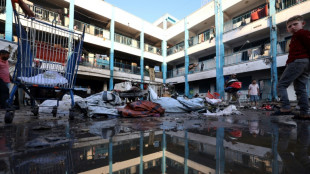 Gaza ceasefire talks resume as Trump upbeat on deal
Gaza ceasefire talks resume as Trump upbeat on deal
-
Stocks rise as Trump delays tariffs deadline
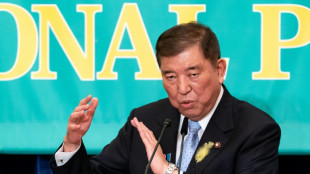
-
 Acropolis shuts, outdoor work halted as heatwave scorches Greece
Acropolis shuts, outdoor work halted as heatwave scorches Greece
-
Newcastle agree £55m fee for Forest's Elanga - reports

-
 German exports to US tumble as Berlin urges quick trade deal
German exports to US tumble as Berlin urges quick trade deal
-
Tottenham sign Japan defender Takai

-
 Cambodian garment workers fret Trump's new tariff threat
Cambodian garment workers fret Trump's new tariff threat
-
Israel-Hamas ceasefire negotiations resume as Trump pushes for deal
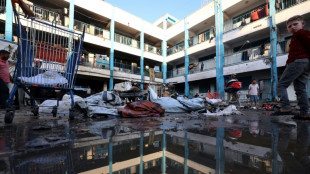
-
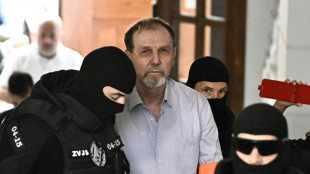 Trial of Slovak gunman who shot PM begins
Trial of Slovak gunman who shot PM begins
-
Wallabies' Lolesio faces long rehab after surgery

-
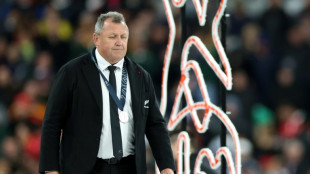 Lions not invincible says former All Blacks coach Foster
Lions not invincible says former All Blacks coach Foster
-
Markets rise as Trump sends tariff letters, delays deadline
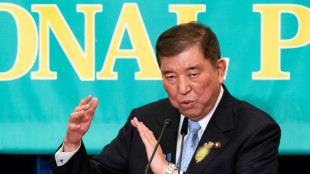
-
 Australia-born Lion Hansen faces 'pinch-me' moment against old team
Australia-born Lion Hansen faces 'pinch-me' moment against old team
-
Mitre by mitre: N. Macedonian nuns craft priceless holy headwear

-
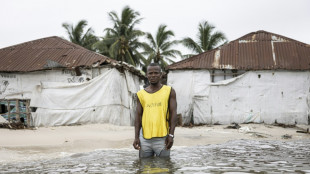 S.Leone islanders despair as rising ocean threatens survival
S.Leone islanders despair as rising ocean threatens survival
-
Bulgaria to get final green light to adopt euro in 2026
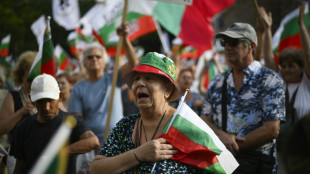
-
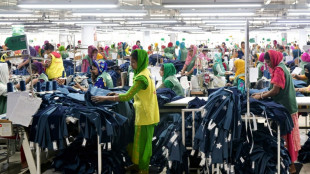 Major garment producer Bangladesh seeks deal after 35% US tariff
Major garment producer Bangladesh seeks deal after 35% US tariff
-
France's Macron kicks off pomp-filled UK state visit
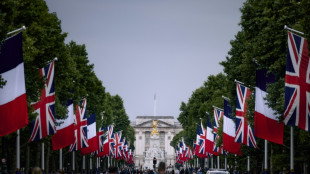
-
 Mbappe and PSG set for Club World Cup reunion as Real Madrid eye final
Mbappe and PSG set for Club World Cup reunion as Real Madrid eye final
-
US to send 'more weapons' to Ukraine: Trump

-
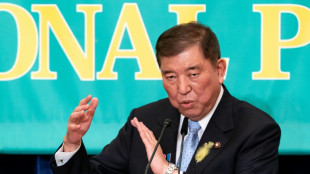 Most markets rise as Trump sends tariff letters, delays deadline
Most markets rise as Trump sends tariff letters, delays deadline
-
Slovak gunman who shot PM to go on trial
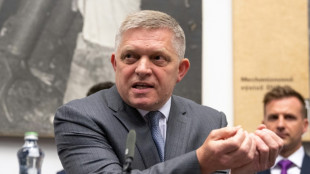
-
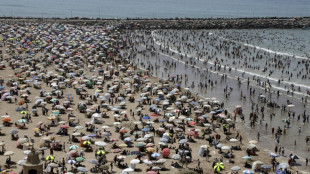 As heatwaves intensify, Morocco ups effort to warn residents
As heatwaves intensify, Morocco ups effort to warn residents
-
All Blacks captain Scott Barrett out for rest of France series

-
 AI video becomes more convincing, rattling creative industry
AI video becomes more convincing, rattling creative industry
-
Trump says new tariff deadline 'not 100 percent firm'
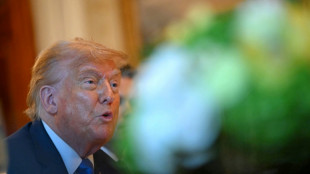

Bulgaria becomes 21st member to adopt euro after EU green light
EU ministers gave the final green light on Tuesday for Bulgaria to adopt the euro on January 1, 2026, making it the single currency area's 21st member.
Bulgaria's switch from the lev to the euro comes nearly 19 years after the country of 6.4 million people joined the European Union.
"We did it!" Bulgarian Prime Minister Rossen Jeliazkov said.
"We thank all institutions, partners and everyone whose efforts made this landmark moment possible. The government remains committed to a smooth and effective transition to the euro in the interest of all citizens," Jeliazkov said on X.
In adopting the legal texts necessary for the move, EU finance ministers officially set the euro at 1.95583 Bulgarian lev.
"Joining the euro area is much more than just about replacing lev with euro. It is about building a brighter and more prosperous future for Bulgaria and its citizens at the heart of Europe," EU economy chief Valdis Dombrovskis said after the approval.
"The euro will bring new opportunities, investments, jobs and growth," he said.
The European Commission last month said the EU's poorest country had fulfilled the strict conditions to adopt the euro, while the European Central Bank (ECB) also gave a positive opinion.
Bulgaria's journey to joining the eurozone has had a stormy political backdrop with seven elections in three years -- the last in October 2024.
But recent polls show Bulgarian society remains divided on the euro, with experts attributing the scepticism largely to fears of rising prices and declining purchasing power.
President Rumen Radev shocked many when he proposed holding a referendum on the matter but that was given short shrift by the Bulgarian parliament.
Since June, protesters have gathered in Sofia to call for "keeping the Bulgarian lev". A symbolic protest camp with several tents has been set up near the presidency and the Bulgarian National Bank in the capital.
Far-right opposition parties have used the issue to promote anti-EU narratives.
Proponents in Bulgaria, however, insist the move will help improve the country's economy, and reinforce its ties to the West and protect against Russia's influence.
"The political benefits are becoming increasingly significant, as the protests against the euro seem to bear the mark of the Kremlin," 43-year-old musician Veselin Dimitrov told AFP in Sofia.
- Euro club gets bigger -
The green light comes as the euro has been gaining in value against the US dollar as President Donald Trump's protectionist trade policies shake trust in the US currency.
Only 12 countries were part of the single currency area -- including France, Germany, Italy, Spain, and Greece -- when the first euro bills and coins were rolled out on January 1, 2002.
It gradually widened with Slovenia joining in 2007, Cyprus and Malta in 2008, Slovakia in 2009, Estonia in 2011, Latvia in 2014 then Lithuania in 2015.
Croatia was the last country to join in 2023, bringing the total to 20.
Bulgaria wanted to adopt the euro sooner but Brussels judged its inflation was too high to meet the necessary criteria.
EU states that want to join the single currency must demonstrate that their economy has converged with other eurozone countries and that they have their finances under control.
The conditions include holding inflation to no more than 1.5 percentage points higher than the rate of the three best-performing EU countries.
When Brussels gave its backing in June, it said Bulgaria's average inflation rate during the 12 months to April 2025 was 2.7 percent, just below the needed level.
F.Dubois--AMWN